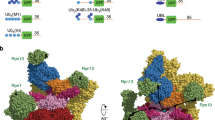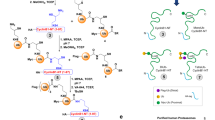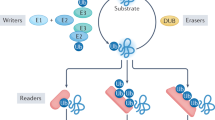Abstract
MHC class I molecules function to present peptides eight to ten residues long to the immune system. These peptides originate primarily from a cytosolic pool of proteins through the actions of proteasomes1, and are transported into the endoplasmic reticulum, where they assemble with nascent class I molecules2. Most peptides are generated from proteins that are apparently metabolically stable. To explain this, we previously proposed that peptides arise from proteasomal degradation of defective ribosomal products (DRiPs). DRiPs are polypeptides that never attain native structure owing to errors in translation or post-translational processes necessary for proper protein folding3. Here we show, first, that DRiPs constitute upwards of 30% of newly synthesized proteins as determined in a variety of cell types; second, that at least some DRiPs represent ubiquitinated proteins; and last, that ubiquitinated DRiPs are formed from human immunodeficiency virus Gag polyprotein, a long-lived viral protein that serves as a source of antigenic peptides.
This is a preview of subscription content, access via your institution
Access options
Subscribe to this journal
Receive 51 print issues and online access
$199.00 per year
only $3.90 per issue
Buy this article
- Purchase on Springer Link
- Instant access to full article PDF
Prices may be subject to local taxes which are calculated during checkout




Similar content being viewed by others
References
Rock,K. L. & Goldberg,A. L. Degradation of cell proteins and the generation of MHC class I-presented peptides. Annu. Rev. Immunol. 17, 739–779 ( 1999).
Pamer,E. & Cresswell,P. Mechanisms of MHC class I restricted antigen processing. Annu. Rev. Immunol. 16, 323–358 (1998).
Yewdell,J. W., Antón,L. C. & Bennink, J. R. Defective ribosomal products (DRiPs). A major source of antigenic peptides for MHC class I molecules? J. Immunol. 157, 1823–1826 (1996).
Fenteany,G. et al. Inhibition of proteasome activities and subunit-specific amino-terminal threonine modification by lactacystin. Science 268, 726–731 (1995).
Rock,K. L. et al. Inhibitors of the proteasome block the degradation of most cell proteins and the generation of peptides presented on MHC class I molecules. Cell 78, 761–771 (1994).
Vinitsky,A., Michaud,C., Powers,J. C. & Orlowski,M. Inhibition of the chymotrypsin-like activity of the pituitary multicatalytic proteinase complex. Biochemistry 31, 9421– 9428 (1992).
Fujimuro,M., Sadada,H. & Yokosawa, H. Production and characterization of monoclonal antibodies specific to multi-ubiquitin chains of polyubiquitinated proteins. FEBS Lett. 349, 173–180 (1994).
Wojcik,C., Schroeter,D., Wilk,S., Lamprecht,J. & Paweletz, N. Ubiquitin-mediated proteolysis centers in HeLa cells: indication from studies of an inhibitor of the chymotrypsin-like activity of the proteasome. Eur. J. Cell Biol. 71, 311–318 (1996).
Johnston,J. A., Ward,C. L. & Kopito,R. R. Aggresomes: a cellular response to misfolded proteins. J. Cell. Biol. 143, 1883– 1898 (1998).
Anton,L. C. et al. Intracellular localization of proteasomal degradation of a viral antigen. J. Cell Biol. 146, 113– 124 (1999).
Steinman,R. M. in Fundamental Immunology (ed. Paul, W. E.) 547– 604 (Lippincott–Raven, Philadelphia, 1998).
Townsend,A. et al. Association of class I major histocompatibility heavy and light chains induced by viral peptides. Nature 340, 443–448 (1989).
Degen,E. & Williams,D. B. Participation of a novel 88-kD protein in the biogenesis of murine class I histocompatibility molecules. J. Cell Biol. 112, 1099– 1115 (1991).
Reits,E. A. J., Vos,J. C., Grommé, M. & Neefjes,J. The major substrates for TAP in vivo are derived from newly synthesized proteins. Nature 404, 774–778 ( 2000).
Rammensee,H. -G., Bachmann,J. & Stevanovic, S. MHC Ligands and Peptide Motifs (Landes Bioscience, Austin, 1997).
Engelhard,V. H. Structures of peptides associated with class I and class II MHC molecules. Annu. Rev. Immunol. 12, 181– 207 (1994).
Alberts,B. et al. Molecular Biology of the Cell (Garland, New York, 1994).
Adachi,A. et al. Production of acquired immunodeficiency syndrome-associated retrovirus in human and nonhuman cells transfected with an infectious molecular clone. J. Virol. 59, 284–291 (1986).
Acknowledgements
We thank B. Buschling for technical assistance. C.N. is the recipient of a Wellcome Prize Traveling Fellowship; U.S. was supported by grant Schu11/2-1 and a Heisenberg grant from the Deutsche Forschungsgemeinschaft.
Author information
Authors and Affiliations
Corresponding author
Supplementary information
Supplementary Information
Supplementary Information (PDF 135 kb)
Rights and permissions
About this article
Cite this article
Schubert, U., Antón, L., Gibbs, J. et al. Rapid degradation of a large fraction of newly synthesized proteins by proteasomes. Nature 404, 770–774 (2000). https://doi.org/10.1038/35008096
Received:
Accepted:
Issue Date:
DOI: https://doi.org/10.1038/35008096
This article is cited by
-
Protein phosphatase 1 regulatory subunit 15 A promotes translation initiation and induces G2M phase arrest during cuproptosis in cancers
Cell Death & Disease (2024)
-
Deregulated protein homeostasis constrains fetal hematopoietic stem cell pool expansion in Fanconi anemia
Nature Communications (2024)
-
Targeting ubiquitin specific proteases (USPs) in cancer immunotherapy: from basic research to preclinical application
Journal of Experimental & Clinical Cancer Research (2023)
-
Loss of PML nuclear bodies in familial amyotrophic lateral sclerosis-frontotemporal dementia
Cell Death Discovery (2023)
-
A biochemomechanical model of collagen turnover in arterial adaptations to hemodynamic loading
Biomechanics and Modeling in Mechanobiology (2023)
Comments
By submitting a comment you agree to abide by our Terms and Community Guidelines. If you find something abusive or that does not comply with our terms or guidelines please flag it as inappropriate.



